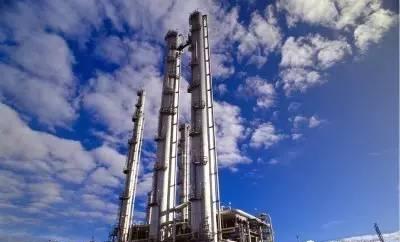
(File photo)
■ Fan Yuan, reporter of China Economic Times
Saudi Arabia and other 9 countries cut off diplomacy with Qatar, the Gulf countries crisis escalated, becoming the biggest "black swan" in the market last week, however, the international oil prices that are most likely to be affected have not been alarmed, but the global gas market traders have tightened their nerves.
Historically, political friction between the Middle East's major oil producers has often led to spikes in global oil prices.
On June 5, Saudi Arabia, Bahrain, Egypt, and the United Arab Emirates announced the severance of diplomatic relations with Qatar and all land, sea and air ties.
As a result, fears of crude oil supply disruptions heated up, and international oil prices subsequently surged more than 1.5%. 5%, Brent and U.S. WTI both returned above the $50 and $48 mark.
The political turmoil in the Middle East this time affects not oil, but another important energy source: natural gas.
As of June 7, the number of countries that have severed diplomatic relations with Qatar has increased to nine, and traders in the global gas market are on high alert as disputes in the Gulf states escalate.
Qatar, a small country in the eastern part of the Arabian Peninsula, has long played a pivotal role in the gas market and is the world's largest exporter of liquefied natural gas (LNG). Qatar exported about 77.2 million tonnes of LNG in 2016, equivalent to about one-third of global supply, according to the International Gas Union. According to BP's World Energy Statistics Assessment, most of Qatar's natural gas is located in its huge offshore northern gas field, ranking third in the world for proven natural gas reserves, behind Russia and Iran.
According to Reuters, Qatari oil and gas ships will choose more expensive sea routes as the UAE shuts down Qatari cargo ship supply depots, which could disrupt the established schedule for Qatari ships sailing to Asia, Europe and the United States to stop at the port for refueling.
According to Bloomberg, citing foreign affairs experts, even if Qatari cargo ships are currently barred from passing through the waters of Saudi Arabia and other Arab countries, Qatar's gas and oil exports will not be affected for the time being, and these cargo ships can choose to bypass Iranian waters and then pass through Omani territory through the Strait of Hormuz. If Oman joins in severing diplomatic relations and blockades Qatar, Qatar will have no choice but to rely more on Iran for energy exports.
For now, there is no indication that Qatar's gas exports will be affected by its dispute with neighboring Saudi Arabia.
Qatar's natural gas exports are mainly sold around the world through LNG carriers. Qatar's main customers of natural gas are in Asia, of which about 15% of Japan's natural gas is purchased from Qatar, and China and India are also its main customers. Buyers in the Middle East account for less than 5% of Qatar's total gas exports. The world's largest LNG importer and Japanese company JeraCo. Assurances had been received from Qatar Gas and that gas exports would continue as originally planned. LNG prices are usually determined by long-term contracts between supplier and consumer countries and are usually based on a calculation formula related to oil prices. However, in recent years, the spot market has also expanded as global natural gas supplies from countries such as the United States and Australia have increased. Analysts say the latest diplomatic turmoil will not have any immediate impact on demand from big natural gas consumers for now.
However, the Gulf crisis may open a window for the United States to export more LNG for this severance of diplomatic relations. But russia, as the world's largest exporter of natural gas, is likely to be the biggest beneficiary before the United States makes a big export of LNG to the world.
As the world's most important energy exporter, the Gulf region affects the nerves of the world economy, and although the diplomatic earthquake has not caused a violent impact on the energy market in the short term, as a microcosm of the confrontation between the Gulf countries, the future developments and the impact on global energy supply still make global traders highly vigilant.
Chief Editor 丨 Mao Jinghui Editor 丨 Cao Yang
【China Economic Times--China Economic News Network http://www.cet.com.cn】